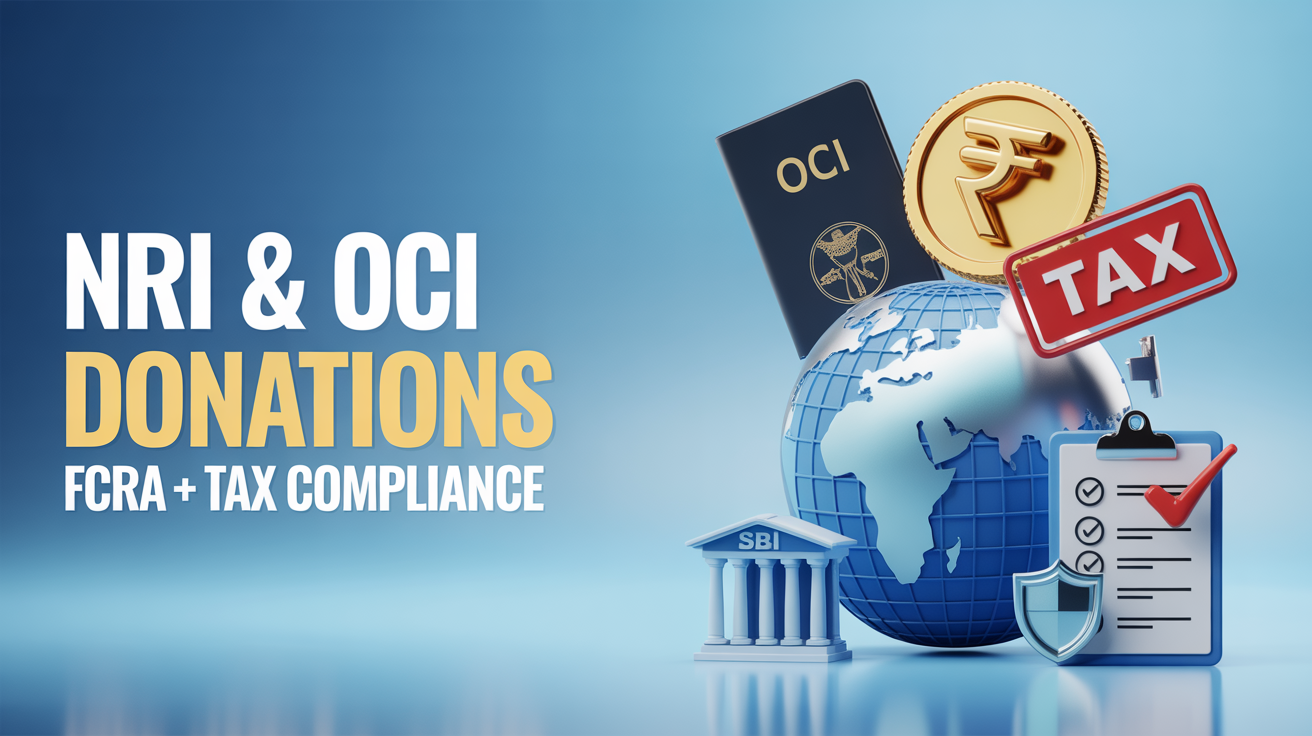
Donations from Non-Resident Indians (NRIs) and Overseas Citizens of India (OCIs)
Overview
Contributions from Non-Resident Indians (NRIs) and Overseas Citizens of India (OCIs) are classified as foreign contributions under the FCRA, 2010, requiring NGOs to hold valid FCRA registration to accept them legally. These donations, when received through a designated FCRA account, may qualify for tax deductions under Section 80G for donors, provided the NGO is registered under this section. The 2020 FCRA amendments have heightened scrutiny on donor residency status, making compliance a critical aspect of managing such contributions. Missteps in verifying donor identity or failing to adhere to FCRA protocols can lead to severe penalties, including fund seizure and tax liabilities, underscoring the need for meticulous compliance.
Statutory Framework
Section 11 of the FCRA, 2010, mandates that NGOs obtain registration or prior per mission to accept foreign contributions, including those from NRIs and OCIs. The 2020 amendments explicitly clarified that OCI donations are treated as foreign contributions, subject to the same regulations. Under the Income Tax Act, 1961, Section 80G allows donors to claim deductions of 50.
Tax and Legal Treatment Analysis
NGOs must hold FCRA registration to legally accept NRI/OCI donations, which must be deposited in a designated SBI account. Donors can claim Section 80G deductions, enhancing the appeal of contributing to registered NGOs. However, non-compliance with FCRA, such as accepting donations without registration, renders the funds taxable under Section 2(24) and subject to seizure. The interplay between FCRA and Income Tax regulations requires NGOs to verify donor residency status and ensure all transactions are properly documented to maintain tax exemptions and avoid legal repercussions.
Judicial and Regulatory Insights
The 2020 FCRA amendments clarified the treatment of OCI donations as foreign contributions, reinforcing the need for FCRA compliance (FCRA Regulations). The Supreme Courts ruling in *CIT v. Andhra Chamber of Commerce (1965) 55 ITR 722* emphasized that charitable activities must benefit the public at large, impacting the classification of donations and their tax treatment. These insights highlight the judiciarys focus on ensuring transparency and public benefit in the management of foreign contributions.
Practical Scenarios
In one scenario, an NRI donates Rs. 2 lakhs to an FCRA-registered NGO via the designated SBI account for an education program. The NGO applies the funds appropriately, and the donor claims a Section 80G deduction, ensuring compliance. In contrast, an OCI donates Rs. 1 lakh to an unregistered NGO, leading to seizure of the funds and taxation as income due to FCRA violation. Another case involves an NGO accepting an NRI donation without verifying residency status, resulting in penalties and tax scrutiny when the donor is confirmed as a non-resident.
Common Pitfalls and Mitigation Strategies
A prevalent pitfall is misclassifying NRI/OCI donations as domestic contributions, leading to FCRA violations and tax liabilities. NGOs can mitigate this by verifying donor residency status through passports or OCI cards before accepting donations. Another error is accepting NRI/OCI donations without FCRA registration, risking fund seizure and legal penalties. Obtaining FCRA registration or prior permission is essential. In adequate documentation of donor details also invites scrutiny; NGOs should maintain comprehensive records of donor identity and contribution specifics to ensure compliance.
Professional Recommendations
NGOs should diligently verify whether donors are NRIs or OCIs to ensure compliance with FCRA regulations. Obtaining FCRA registration is critical for accepting such donations legally, and all contributions must be channeled through the designated SBI FCRA account. Ensuring donations qualify for Section 80G deductions and Section 11 exemptions requires meticulous record-keeping. Engaging legal experts to navigate FCRA and tax complexities and conducting regular audits to verify compliance are prudent measures to safeguard NGO operations.
Conclusion
Donations from NRIs and OCIs, treated as foreign contributions under FCRA, require NGOs to hold valid registration and adhere to strict compliance protocols. Proper documentation and verification of donor status ensure tax exemptions and deductions, while non-compliance risks severe penalties. By prioritizing FCRA and Income Tax compliance, NGOs can maintain their financial integrity and donor trust.
Charitable Organisations – Taxation & Compliance (Legal Research Guide) Th...
Social Stock Exchanges 1.1 Background We often feel like helping t...
How to File Annual Returns Under FCRA (Form FC-4) 3.1 Legal Framework Section 19 of t...
PUBLIC INSTITUTIONS EXEMPT FROM TAX [SECTION 10] The Income Tax Act of India, under S...
Difference Between Trust, Society, and Section 8 Company Selecting the right NGO structure (Trus...
BOI (Body of Individuals) and AOP (Association of Persons) are two different terms used in Indian ...
Form 10BD and 80G Compliance Legal Framework Section 80G(5)(viii) of the Income Tax A...
Foreign Travel for NGO Work: Does It Require FCRA Approval? The FCRA governs the acce...
What is a REIT? A Real Estate Investment Trust (REIT) is a company that owns, manages, or ...
New Income Tax Return Filing Requirements for NGOs – Form ITR-7 Explained Legal Framewo...